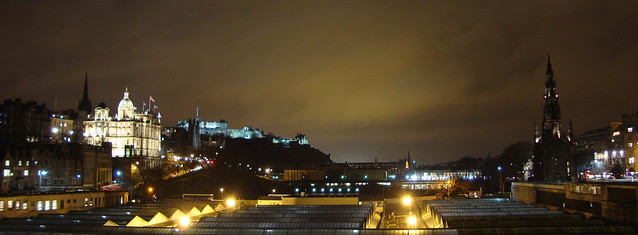I was in Edinburgh last week for work, and found myself one evening sitting at the bar in a pub waiting for a friend.
A man next to me, also by himself, noticed the unusual beer I was ordering and asked what it was. We got talking. A former soldier and now in the building trade, he had lots of good stories to tell from his army days. As the conversation shifted to me, he asked what I’d studied at university.
“Politics” I replied.
“So, what’s your answer?”
I laughed at the way he put it.
“If it’s the question I think you mean it’s yes.”
“Aye, that’s what I meant. I’m a no myself.”
I asked him why.
“Better the devil you know.”
“Well, the other devil on offer is ourselves,” I argued. “It’s either decisions get made by the UK, or by ourselves.”
“But I just don’t trust the SNP,” he said.
It’s a common argument: people disliking independence because they don’t like Alex Salmond or the SNP. It’s a perplexing one too, though, because if you think about it the SNP have plenty to lose upon independence as this poster on this website argues. I’m not convinced myself that they’ll disappear in a flash upon a Yes vote, but in the longer term they’ll struggle to remain relevant if they don’t find a new core purpose. At the very least, they’ll lose a small number of votes from recent converts.
“That’s OK,” I replied to my new friend. “Imagine another party in control instead.”
“So… when we vote Yes/No…” he chewed over the issue slowly, clearly one he’d thought little about. “…will we be voting for a party too?”
“No, it’s a straight yes/no,” I said. “There’s Scottish Parliament elections due in 2016. If we vote yes, they’ll be elections for the first independent parliament. If we vote no, it’ll be elections like normal. It could be Labour running an independent Scotland, for instance.”
“And could they go back again, and renegotiate the Union?”
I thought for a moment. What an unusual question. I’d never really thought about it.
“I suppose they could,” I conceded. “After all that effort it’s hardly likely, but technically it’s possible.”
Now it was his turn to think as he mulled over my answer.
At that moment, the friend I was waiting for turned up and my conversation with the chatty ex-squaddy came to an end. I’d happily have talked more about the referendum with him, but in a sense it was perhaps better I didn’t. Having learned some basic information a seed had planted in his head, and he was no doubt ready to think about it more by himself without a further barrage of partisan arguments from yours truly. It chimes with some of Yes Scotland’s research that those who feel they’re better informed about the referendum are more likely to vote yes.
In our short chat I certainly hadn’t turned him into a yes, but with just that wee nugget of information about the 2016 election he’d probably shifted from no to “don’t know”.
Not bad for a quick chat in a pub.




“It’s either decisions get made by the UK, or by ourselves.”
But since we are currently part of the UK, decisions are already being made by “ourselves”. We elect MPs to Westminster just like every other part of the UK. You make it sound like they are being made by a foreign country and Scottish voters have no say.
And if the argument is that a Scottish Parliament would be making decisions closer to home, then why stop there? Why should I accept decisions being made in Edinburgh, when they could be made in Kirkintilloch by an independent East Dunbartonshire?
Thanks for your comment Stephen.
On your first point, it’s not that we have no say – specifically, instead, we have about 8% of a say because that’s all that Scotland’s MPs are as a proportion of the House of Commons where reserved issues are decided. Yes we are part of the UK, but an 8% vote share doesn’t really add up to us making decisions ourselves. Instead, they’re made by the UK as a whole which frequently acts against our interests, and there’s nothing (short of a yes vote) to stop UK governments we may not have voted for enforcing things against our will. So it’s not no say, but it’s pretty close to it.
And secondly, in terms of accepting decisions made in Edinburgh, well yes, quite! Why not have more decisions being made by local authorities that have considerably more powers than they do at the moment? And why have such large councils like East Dunbartonshire or indeed Highland, when you could have much smaller authorities that are relevant to individual towns, villages and communities?
Such strong local government is a feature of many of the Scandinavian countries, where you often have local authorities serving just a couple of thousand people or less, often with responsibility for raising all taxes and passing money up to higher levels of government only where necessary. Check out these two posts on land campaigner Andy Wightman’s website which explores this very theme. It would be great to think we could have local government in Scotland that was truly local, and indeed truly government, bringing decisions (and politicians) closer to the people.
Of course, Scotland has devolved power to reform local government at the moment. For whatever reason, however, it hasn’t happened yet. I’d suggest the fresh thinking that independence will generate is likely to lead to a reform in local government too and indeed the whole question of how we make our decisions. That’s an exciting prospect.